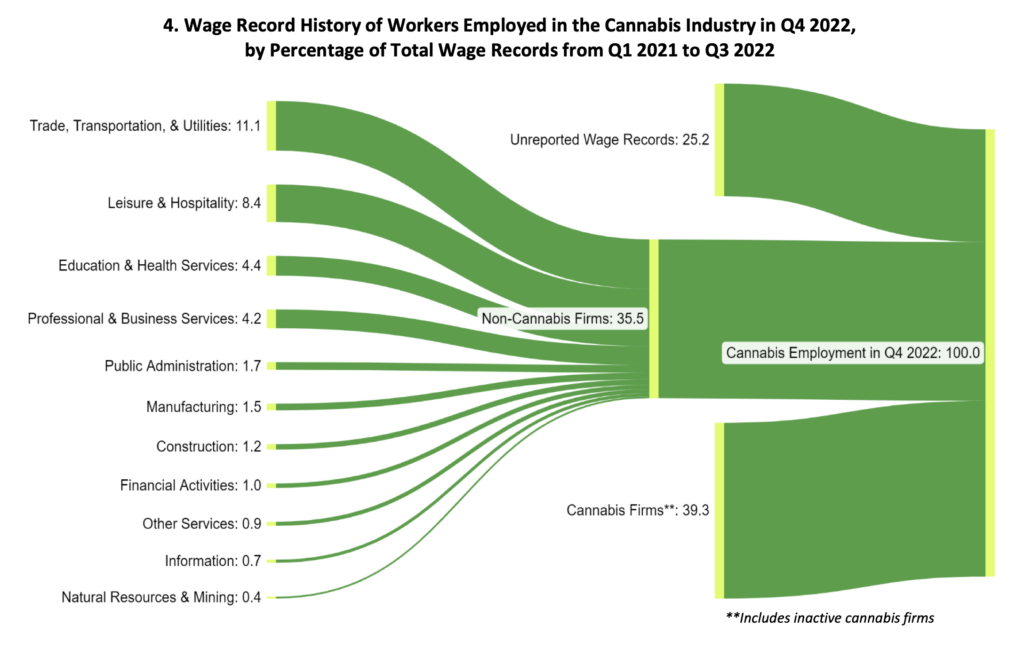Wage earners who joined New Mexico’s legal cannabis industry typically earn more than they did in their previous, non-marijuana jobs, according to a new article in the latest issue of the state Department of Workforce Solutions’s monthly Labor Market Review.
“The data show that for some people, the grass is greener in the cannabis industry,” the report says.
By the end of last year, 4,666 workers in New Mexico were employed in the state’s legal marijuana industry, which officially opened its doors in April 2022. Nearly 9 in 10 of those employees, the Department of Workforce Solutions report found, worked in the retail sector.
During its first year of legal sales to adults, New Mexico saw more than $300 million in sales of recreational cannabis products — a milestone Gov. Michelle Lujan Grisham (D) touted last month. Medical marijuana receipts, meanwhile, totaled another $187.4 million.
Interested in what New Mexico’s cannabis industry looks like in #NewMexico? Check out the special article in the April Labor Market Review.#NMCannabisIndustry #NMJobs #NMWorkforce #AprilLaborMarketReview #NMBusiness #NMJobMarket pic.twitter.com/DFTKJni6Jk
— NMDWS (@NMDWS) May 31, 2023
According to the new state labor report published at the end of last month, average weekly wages for cannabis workers were $560 at the end of 2022 — lower than for most other industries. But by examining wage records for cannabis employees going back to the beginning of 2021, analysts found that those who joined the marijuana industry typically saw a pay raise from their prior jobs.
“One reason why members of this cohort may have left their previous place of employment to work in the cannabis industry is to earn higher wages,” the report says. “Analyzing their wage records shows that their average weekly wage increased once they joined the cannabis industry.”
New Mexico Department of Workforce Solutions
Wage records for roughly a third of cannabis workers indicated they’d come from other industries. The report says that “Trade, transportation, and utilities had the highest share (11.1 percent), followed by leisure and hospitality (8.4 percent), education and health services (4.4 percent) and professional and business services (4.2 percent).”
Another quarter of workers had no reported wage data, suggesting they’d moved from another state, just graduated or were self-employed, the report says. And nearly 4 in 10 wage records came from cannabis firms, “which means they were already working in the industry.”

New Mexico Department of Workforce Solutions
Across New Mexico, 151 cannabis firms were operating in the state during the fourth quarter of 2022. Three-quarters (74.2 percent) were retail stores or online platforms. Another 21 grew and cultivated plants, 10 firms were processors, four were wholesalers and four performed activities not specified in the report.
Most businesses were located around population centers, the report found. Nearly 1 in 3 were based in Bernalillo County, which is the state’s most populous and where Albuquerque is located.
New Mexico Department of Workforce Solutions
Officials in other states have also been talking up marijuana sales in recent months, including neighboring Arizona, where the year-end total for 2022 adult-use cannabis purchases reached $1.4 billion.
In Massachusetts, the state’s recreational market officially exceeded $4 billion in sales in January after launching in 2018.
Conversely, a top Wisconsin senator recently released a legislative analysis that showed just how much money her state lost out to Illinois last year, with Wisconsin residents who lack a regulated market going across the border and spending more than $121 million on marijuana.
In New Mexico, the governor said last month that she is “excited to see what the future holds as we continue to develop an innovative and safe adult-use cannabis industry.” Regulation and Licensing Department Superintendent Linda Trujillo, for her part, said the state is “looking forward to even more growth in year two.”
Lujan Grisham also recently signed a bill to automatically expunge past cannabis crimes, although she opted to veto a separate measure that would have stopped incarcerating people for certain drug offenses.
State lawmakers, meanwhile recently advanced a bill to create a state body that would study the possibility of launching a psilocybin therapy program for patients with certain mental health conditions who could benefit from using the psychedelic. And the state’s medical marijuana program last month added insomnia as a qualifying condition.
Rhode Island House Passes Bill To Legalize Psilocybin And Prepare For Regulated Therapeutic Access
Photo courtesy of Mike Latimer.
Read the full article here